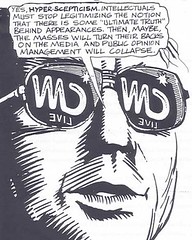
In the Cut (Unrated and Uncut Director’s Edition) (2003) – Jane Campion [Amazon.com] [FR] [DE] [UK]
In the Cut, of course, continues Campion’s career-long examination of female masochism.

In the Cut (1995) – Susanna Moore
[Amazon.com] [FR] [DE] [UK]
I’m halfway through Susanna Moore’s 1995 novel In the Cut, the story of a thirty-something literature teacher in New York City with an interest in street slang who falls in love with a cop of whom she suspects he may also be a serial killer/psychopath. There are lots of similarities here with Erica Jong’s Fear of Flying, which I read last year. Can both be categorized as chick lit? If yes, this kind of chick lit takes it upon itself to study men’s (sexual) behavior in an almost anthropological way. Moore describes how a post-coital man, Erica Jong described one of her lover’s post-toilet behavior.
So far I liked Jane Campion’s film adaption of In the Cut better, Moore’s prose is kind of trite and Moore lacks the philosophical breadth I liked in Fear of Flying.
What In the Cut and Fear of Flying also share is the concept of women’s sexuality after the sexual revolution, a topic I’ve first mentioned in my profile of Looking for Mr. Goodbar (1977).
Speaking of the end of the sexual revolution which oficially arrived in 1984 (cfr. TIME cover) and which coincides with the arrival of AIDS (see Benetton AIDS ad) and of postmodernism: many writers of the pre- and sexual revolution era such as Gershon Legman, Wayland Young (Eros Denied), Gordon Rattray Taylor and Amos Vogel (Film as a Subversive Art) foreshadowed utopia as soon as we would get rid of our sexual inhibitions.
I quote from Jim Haynes’s website[1]:
“Murder is a crime; describing murder is not. Sex is not a crime. Describing sex is. Why?” –Gershon Legman.
“If we were sexually liberated there’d be no president, no police force, no night sticks, no governments.” –Germaine Greer.
The utopia did not happen because of the aforementioned AIDS epidemic and what I suspect a whole range of reasons. Personally I like the concept of inhibitions, the concept of taboos, the concept of shame and guilt; not only are these inhibitions what makes sex exciting in the first place but I suspect that they are necessary to regulate a society. If these inhibitions would not be there life would be an eternal recurrence of the orgy in Perfume. Maybe I should read this?
The only writer that comes to mind who has dealt with this subject is Camille Paglia.
Well, um, what I’m saying is that I’m part of the sexual revolution, um, and I feel that the…in one of my most controversial sentences is “Everybody who preached free love in the 60’s is responsible for AIDS.” I mean by that the Mama’s and the Papa’s and all of us, so, the price of that revolution has been paid by gay men, primarily. I think that what we’re understanding is the enormous power of nature. Even Larry Kramer is starting to talk like this now: that nature apparently did not want us to be promiscuous and that it puts a thousand obstacles in our paths such as these diseases. OK. I feel that procreation is nature’s law, and that’s why I defy nature, I resist it, I oppose it. OK. I think that women certainly are in the..um, you know we were the first generation to have the birth control pill, OK, which frustrates nature. […] –Camille Paglia interviewed by Jack Nichols, 1997
But of course there must be other literature out there, and if you know of any, I’m looking forward to your recommendations.






